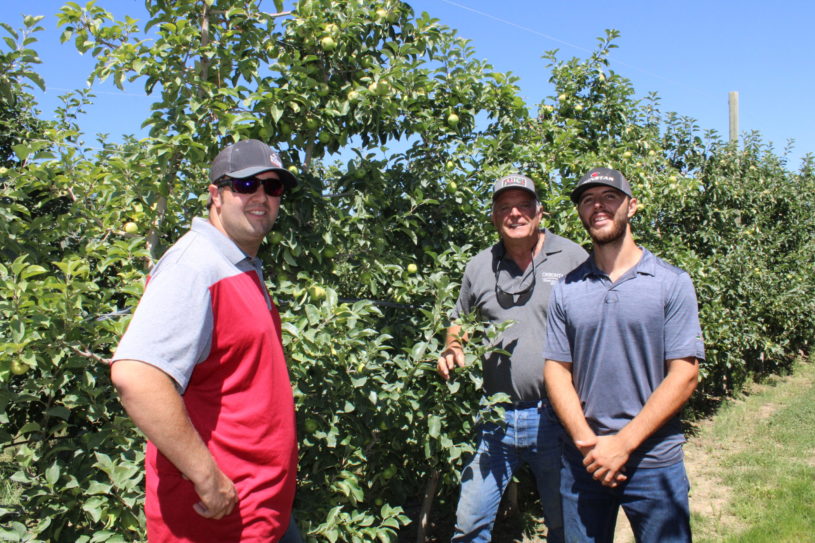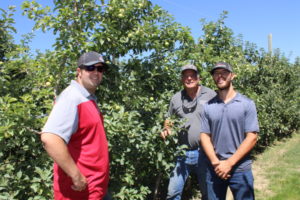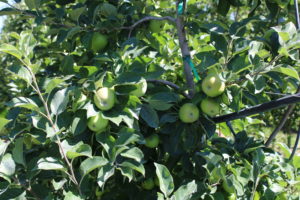
Feb 16, 2023
Organic options help Washington apple grower stay competitive
Organics is part of a Washington father and son’s tree fruit operation. RJK Farms, in Quincy, Washington, has changed the way it does business to remain competitive in challenging times.
RJK grows organic Golden apples for processing markets. It’s transitioning a handful of blocks of Honeycrisps to organic. Organics constitute 75 acres of the operation’s 450 acres of tree fruit. RJK’s 1,200 total farm acres include hay and other row crops, plus an additional 2,000 leased acres.

A third-generation farmer, Kent Karstetter, along with sons Brady and Mitchell, also grow conventional cherries and pears.
RJK is planting organic Honeycrisps because he can plant them on a site possessing low insect pressure, making the pests less of a threat.
“We are only transitioning to organics on blocks that make sense mainly due to bug pressure,” said the older Karstetter. “If you’re in a high-pressure site, you can’t control the bugs.”
As the Karstetters were already using organic practices, except for weed control and fertilizer, in that block, moving to organics was a natural step, Karstetter said.
When one examines conventional apple growing, a third to as much as 60% of Washington’s commercial orchards are basically organic, Karstetter said. This is when one considers the agronomic practices growers employ, which include mating disruption, composting and using cover crops to return nitrogen to the oil.
While some chemicals used in conventional farming could be considered somewhat organic, they cannot be organically certified because an input may include a non-organic ingredient.
“What we’ve seen is the conventional farmer can sometimes get a black eye because most farmers are doing what’s best for the soil, because soil is the motor,” Karstetter said. “Soil is key. There are a lot of conventional farmers that do a lot of organic practices. It all comes down to we must keep that soil healthy.”
Soil and water drive a grower’s production.
“It’s in your best interest to try to nurture that and let it survive and let it get to where it gives you the best potential and the best opportunity to give you the best outcome,” Karstetter said. “The tools learned through organic farming are far better than conventional farming.”
RJK is named after Kent, his father Richard and brother Jerry. It began in 1961 when the elder Karstetter, a firefighter who died in 2021 at 86, joined some investors. The orchard is one of the oldest high-density orchards using dwarf trees that remain in existence. By 1990, the two brothers and father became the remaining investors.

To battle escalating costs, RJK prepays for supplies. Recently, it spent $70,000 on liquid nitrogen for next fall, hedging to protect itself against prices that could shoot to $100,000.
RJK also keeps its finances live, within a week or two in its books, to gauge profitability and to help ensure adequate supplies in an uncertain marketplace. When making deals, RJK is careful to wait until closing before signing up for what it thinks prices could be.
RJK employs a regenerative system. The Karstetters bale and haul hay from grain farms to dairies and feedlots, for use as bedding. The orchards use the dairies’ manure as fertilizer, which returns carbon to the soil and also helps with water. That practice led RJK to begin doing its own composting. It composts every year instead of every couple of years.
With rising costs, there’s only so much compost available. If a grower’s name isn’t in the ring, it won’t receive supplies already reserved.
In the long term, Karstetter believes organic practices could be limited.
“I somewhat think organic is not sustainable because sooner or later, you will get bug pressure that will make it so bad to where you either have to pull out of organic because you will have to use a non-organic chemical, or it gets cost- prohibitive,” he said.
Karstetter noted how on a block of Golden apples, he spent $1,600 an acre spraying for coddling moths. It was either spend the money for that or remove the block from organic production, he said.
“There comes a point in time, especially with the way labor is when they’re cutting our labor, when you have to spray it,” Karstetter said. “It’s not like you can sit in an office and say you will do it tomorrow. If you don’t do it now and the eggs hatch, you set yourself up for a whole other generation, which means having to spend double the money.”
Still, Karstetter remains optimistic about organic tree fruit.
“Someone once told me if you never have your pole in the water, you will never catch any fish,” he said. “It’s easy for someone to tell me how great or terrible organics are. But, until you feel it in your wallet, you don’t know because everyone’s situation is different.
“What I found in life is the only way one can figure something out is you have to give it a try.”









